- Home
- Ian Fleming
Bond 03 - Moonraker Page 9
Bond 03 - Moonraker Read online
Page 9
‘Now,’ said Professor Train, ‘you know nothing about rockets so I’m going to put this in simple terms and not fill you up with a lot of stuff about Nozzle Expansion Ratios, Exhaust Velocity, and the Keplerian Ellipse. The Moonraker, as Drax chooses to call it, is a single-stage rocket. It uses up all its fuel shooting itself into the air and then it homes on to the objective. The V2’s trajectory was more like a shell fired from a gun. At the top of its 200-mile flight it had climbed to about 70 miles. It was fuelled with a very combustible mixture of alcohol and liquid oxygen which was watered down so as not to burn out the mild steel which was all they were allocated for the engine. There are far more powerful fuels available but until now we hadn’t been able to achieve very much with them for the same reason, their combustion temperature is so high that they would burn out the toughest engine.’
The Professor paused and stuck a finger in Bond’s chest. ‘All you, my dear sir, have to remember about this rocket is that, thanks to Drax’s Columbite which has a melting point of about 3,500 degrees Centigrade, compared with 1,300 in the V2 engines, we can use one of the super fuels without burning out the engine. In fact,’ he looked at Bond as if Bond should be impressed, ‘we are using fluorine and hydrogen.’
‘Oh, really,’ said Bond reverently.
The Professor looked at him sharply. ‘So we hope to achieve a speed in the neighbourhood of 15,000 miles an hour and a vertical range of about 1,000 miles. This should produce an operational range of about 4,000 miles, bringing every European capital within reach of England. Very useful,’ he added drily, ‘in certain circumstances. But, for the scientists, chiefly desirable as a step towards escape from the earth. Any questions?’
‘How does it work?’ asked Bond dutifully.
The Professor gestured brusquely towards the diagram. ‘Let’s start from the nose,’ he said. ‘First comes the warhead. For the practice shoot this will contain upper-atmosphere instruments, radar and suchlike. Then the gyro compasses to make it fly straight – pitch-and-yaw gyro and roll gyro. Then various minor instruments, servo motors, power supply. And then the big fuel tanks – 30,000 pounds of the stuff.
‘At the stern you get two small tanks to drive the turbine. Four hundred pounds of hydrogen peroxide mixes with forty pounds of potassium permanganate and makes steam which drives the turbines underneath them. These drive a set of centrifugal pumps which force the main fuel into the rocket motor. Under terrific pressure. Do you follow me?’ He cocked a dubious eyebrow at Bond.
‘Sounds much the same principle as a jet plane,’ said Bond.
The Professor seemed pleased. ‘More or less,’ he said. ‘But the rocket carries all its fuel inside it, instead of sucking in oxygen from outside like the Comet. Well then,’ he continued, ‘the fuel gets ignited in the motor and squirts out at the end in a continuous blast. Rather like a continuous recoil from a gun. And this blast forces the rocket into the air like any other firework. Of course it’s at the stern that the Columbite comes in. It’s allowed us to make a motor that won’t be melted by the fantastic heat. And then,’ he pointed, ‘those are the tail fins to keep it steady at the beginning of its flight. Also made of Columbite alloy or they’d break away with the colossal air pressure. Anything else?’
‘How can you be certain it’ll come down where you mean it to?’ asked Bond. ‘What’s to prevent it falling on The Hague next Friday?’
‘The gyros will see to that. But as a matter of fact we’re taking no chances on Friday and we’re using a radar homing device on a raft in the middle of the sea. There’ll be a radar transmitter in the nose of the rocket which will pick up an echo from our gadget in the sea and home on to it automatically. Of course,’ the Professor grinned, ‘if we ever had to use the thing in wartime it would be a great help to have a homing device transmitting energy from the middle of Moscow or Warsaw or Prague or Monte Carlo or wherever we might be shooting at. It’ll probably be up to you chaps to get one there. Good luck to you.’
Bond smiled non-committally. ‘One more question,’ he said. ‘If you wanted to sabotage the rocket what would be the easiest way?’
‘Any number,’ said the Professor cheerfully. ‘Sand in the fuel. Grit in the pumps. A small hole anywhere on the fuselage or the fins. With that power and at those speeds the smallest fault would finish it.’
‘Thanks very much,’ said Bond. ‘It seems you’ve got fewer worries about the Moonraker than I have.’
‘It’s a wonderful machine,’ said the Professor. ‘She’ll fly all right if nobody interferes with her. Drax has done a sound job. Wonderful organizer. That’s a brilliant team he put together. And they’ll do anything for him. We’ve got a lot to thank him for.’
Bond did a racing change and swung the big car left at the Charing fork, preferring the clear road by Chilham and Canterbury to the bottlenecks of Ashford and Folkestone. The car howled up to eighty in third and he held it in the same gear to negotiate the hairpin at the top of the long gradient leading up to the Molash road.
And, he wondered, going back into top and listening with satisfaction to the relaxed thunder of the exhaust, and what about Drax? What sort of a reception was Drax going to give him this evening? According to M., when his name had been suggested over the telephone, Drax had paused for a moment and then said, ‘Oh yes. I know the fellow. Didn’t know he was mixed up in that racket. I’d be interested to have another look at him. Send him along. I’ll expect him in time for dinner.’ Then he had rung off.
The people at the Ministry had their own view of Drax. In their dealings with him they had found him a dedicated man, completely bound up in the Moonraker, living for nothing but its success, driving his men to the limit, fighting for priorities in material with other departments, goading the Ministry of Supply into clearing his requirements at Cabinet level. They disliked his hectoring manners but they respected him for his know-how and his drive and his dedication. And, like the rest of England, they considered him a possible saviour of the country.
Well, thought Bond, accelerating down the straight stretch of road past Chilham Castle, he could see that picture too and if he was going to work with the man he must adjust himself to the heroic version. If Drax was willing, he would put the whole affair at Blades out of his mind and concentrate on protecting Drax and his wonderful project from their country’s enemies. There were only about three days to go. The security precautions were already minute and Drax might resent suggestions for increasing them. It was not going to be easy and a great deal of tact would have to be used. Tact. Not Bond’s long suit and not, he reflected, connected in any way with what he knew of Drax’s character.
Bond took the short cut out of Canterbury by the Old Dover Road and looked at his watch. It was six-thirty. Another fifteen minutes to Dover and then another ten minutes along the Deal road. Were there any other plans to be made? The double killing was out of his hands, thank heaven. ‘Murder and suicide while of unsound mind’ had been the coroner’s verdict. The girl had not even been called. He would stop for a drink at the “World Without Want” and have a quick word with the innkeeper. The next day he would have to try and smell out the ‘something fishy’ that Tallon had wanted to see the Minister about. No clue about that. Nothing had been found in Tallon’s room, which presumably he would now be taking over. Well, at any rate that would give him plenty of leisure to go through Tallon’s papers.
Bond concentrated on his driving as he coasted down into Dover. He kept left and was soon climbing out of the town again past the wonderful cardboard castle.
There was a patch of low cloud on top of the hill and a spit of rain on his windshield. There was a cold breeze coming in from the sea. The visibility was bad and he switched on his lights as he motored slowly along the coast-road, the ruby-spangled masts of the Swingate radar station rising like petrified Roman candles on his right.
The girl? He would have to be careful how he contacted her and careful not to upset her. He wondered if she would be any use to hi
m. After a year on the site she would have had all the opportunities of a private secretary to ‘The Chief’ to get under the skin of the whole project – and of Drax. And she had a mind trained to his own particular craft. But he would have to be prepared for her to be suspicious of the new broom and perhaps resentful. He wondered what she was really like. The photograph on her record-sheet at the Yard had shown an attractive but rather severe girl and any hint of seductiveness had been abstracted by the cheerless jacket of her policewoman’s uniform.
Hair: Auburn. Eyes: Blue. Height: 5 ft. 7. Weight: 9 stone. Hips: 38. Waist: 26. Bust: 38. Distinguishing marks: Mole on upper curvature of right breast.
Hm! thought Bond.
He put the statistics out of his mind as he came to the turning to the right. There was a signpost that said Kingsdown, and the lights of a small inn.
He pulled up and switched off the engine. Above his head a sign which said “World Without Want” in faded gold lettering groaned in the salt breeze that came over the cliffs half a mile away. He got out, stretched and walked over to the door of the public bar. It was locked. Closed for cleaning? He tried the next door, which opened and gave access to the small private bar. Behind the bar a stolid-looking man in shirt-sleeves was reading an evening paper.
He looked up as Bond entered, and put his paper down. ‘Evening, sir,’ he said, evidently relieved to see a customer.
‘Evening,’ said Bond. ‘Large whisky and soda, please.’ He sat up at the bar and waited while the man poured two measures of Black and White and put the glass in front of him with a syphon of soda.
Bond filled the glass with soda and drank. ‘Bad business you had here last night,’ he said, putting the glass down.
‘Terrible, sir,’ said the man. ‘And bad for trade. Would you be from the Press, sir? Had nothing but reporters and policemen in and out of the house all day long.’
‘No,’ said Bond. ‘I’ve come to take over the job of the fellow who got shot. Major Tallon. Was he one of your regular customers?’
‘Never came here but the once, sir, and that was the end of him. Now I’ve been put out of bounds for a week and the public has got to be painted from top to bottom. But I will say that Sir Hugo has been very decent about it. Sent me fifty quid this afternoon to pay for the damage. He must be a fine gentleman that. Made himself well liked in these parts. Always very generous and a cheery word for all.’
‘Yes. Fine man,’ said Bond. ‘Did you see it all happen?’
‘Didn’t see the first shot, sir. Serving a pint at the time. Then of course I looked up. Dropped the ruddy pint on the floor.’
‘What happened then?’
‘Well, everybody’s standing back of course. Nothing but Germans in the place. About a dozen of them. There’s the body on the floor and the chap with the gun looking down at him. Then suddenly he stands to attention and sticks his left arm up in the air. “Eil!” he shouts like the silly bastards used to do during the war. Then he puts the end of the gun in his mouth. Next thing,’ the man made a grimace, ‘he’s all over my ruddy ceiling.’
‘That was all he said after the shot?’ asked Bond. ‘Just “Heil”?’
‘That’s all, sir. Don’t seem to be able to forget the bloody word, do they?’
‘No,’ said Bond thoughtfully, ‘they certainly don’t.’
11 ....... POLICEWOMAN BRAND
FIVE MINUTES later Bond was showing his Ministry pass to the uniformed guard on duty at the gate in the high wire fence.
The R.A.F. sergeant handed it back to him and saluted. ‘Sir Hugo’s expecting you, sir. It’s the big house up in the woods there.’ He pointed to some lights a hundred yards further on towards the cliffs.
Bond heard him telephoning to the next guard point. He motored slowly along the new tarmac road that had been laid across the fields behind Kingsdown. He could hear the distant boom of the sea at the foot of the tall cliffs and from somewhere close at hand there was a high-pitched whine of machinery which grew louder as he approached the trees.
He was stopped again by a plain-clothes guard at a second wire fence through which a five-bar gate gave access to the interior of the wood, and as he was waved through he heard the distant baying of police dogs which suggested some form of night patrol. All these precautions seemed efficient. Bond decided that he wouldn’t have to worry himself with problems of external security.
Once through the trees the car was running over a flat concrete apron the limits of which, in the bad light, were out of range even of the huge twin beams of his Marchal headlamps. A hundred yards to his left, on the edge of the trees, there were the lights of a large house half-hidden behind a wall six feet thick, that rose straight up off the surface of the concrete almost to the height of the house. Bond slowed the car down to walking pace and turned its bonnet away from the house towards the sea and towards a dark shape that suddenly glinted white in the revolving beams of the South Goodwin Lightship far out in the Channel. His lights cut a path down the apron to where, almost on the edge of the cliff and at least half a mile away, a squat dome surged up about fifty feet out of the concrete. It looked like the top of an observatory and Bond could distinguish the flange of a joint running east and west across the surface of the dome.
He turned the car back and slowly ran it up between what he now assumed to be a blast-wall and the front of the house. As he pulled up outside the house the door opened and a manservant in a white jacket came out. He smartly opened the door of the car.
‘Good evening, sir. This way please.’
He spoke woodenly and with a trace of accent. Bond followed him into the house and across a comfortable hall to a door on which the butler knocked.
‘In.’
Bond smiled to himself at the harsh tone of the well-remembered voice and at the note of command in the single monosyllable.
At the far end of the long, bright, chintzy living-room Drax was standing with his back to an empty grate, a huge figure in a plum-coloured velvet smoking-jacket that clashed with the reddish hair on his face. There were three other people standing near him, two men and a woman.
‘Ah, my dear fellow,’ said Drax boisterously, striding forward to meet him and shaking him cordially by the hand. ‘So we meet again. And so soon. Didn’t realize you were a ruddy spy for my Ministry or I’d have been more careful about playing cards against you. Spent that money yet?’ he asked, leading him towards the fire.
‘Not yet,’ smiled Bond. ‘Haven’t seen the colour of it.’
‘Of course. Settlement on Saturday. Probably get the cheque just in time to celebrate our little firework display, what? Now let’s see.’ He led Bond up to the woman. ‘This is my secretary, Miss Brand.’
Bond looked into a pair of very level blue eyes.
‘Good evening.’ He gave her a friendly smile.
There was no answering smile in the eyes which looked calmly into his. No answering pressure of her hand. ‘How do you do,’ she said indifferently, almost, Bond sensed, with hostility.
It crossed Bond’s mind that she had been well-chosen. Another Loelia Ponsonby. Reserved, efficient, loyal, virginal. Thank heavens, he thought. A professional.
‘My right-hand man, Dr. Walter.’ The thin elderly man with a pair of angry eyes under the shock of black hair seemed not to notice Bond’s outstretched hand. He sprang to attention and gave a quick nod of the head. ‘Valter,’ said the thin mouth above the black imperial, correcting Drax’s pronunciation.
‘And my – what shall I say – my dogsbody. What you might call my A.D.C., Willy Krebs.’ There was the touch of a slightly damp hand. ‘Ferry pleased to meet you,’ said an ingratiating voice and Bond looked into a pale round unhealthy face now split in a stage smile which died almost as Bond noticed it. Bond looked into his eyes. They were like two restless black buttons and they twisted away from Bond’s gaze.
Both men wore spotless white overalls with plastic zip fasteners at the sleeves and ankles and down the back. Their hair was clos
e-cropped so that the skin shone through and they would have looked like people from another planet but for the untidy black moustache and imperial of Dr. Walter and the pale wispy moustache of Krebs. They were both caricatures – a mad scientist and a youthful version of Peter Lorre.
The colourful ogreish figure of Drax was a pleasant contrast in this chilly company and Bond was grateful to him for the cheerful roughness of his welcome and for his apparent wish to bury the hatchet and make the best of his new security officer.
Drax was very much the host. He rubbed his hands together. ‘Now, Willy,’ he said, ‘how about making one of your excellent dry Martinis for us? Except, of course, for the Doctor. Doesn’t drink or smoke,’ he explained to Bond, returning to his place by the mantelpiece. ‘Hardly breathes.’ He barked out a short laugh. ‘Thinks of nothing but the rocket. Do you, my friend?’
The Doctor looked stonily in front of him. ‘You are pleased to joke,’ he said.
‘Now, now,’ said Drax, as if to a child. ‘We will go back to those leading edges later. Everybody’s quite happy about them except you.’ He turned to Bond. ‘The good Doctor is always frightening us,’ he explained indulgently. ‘He’s always having nightmares about something. Now it’s the leading edges of the fins. They’re already as sharp as razor blades – hardly any wind resistance at all. And he suddenly gets it into his head that they’re going to melt. Friction of the air. Of course everything’s possible, but they’ve been tested at over 3,000 degrees and, as I tell him, if they’re going to melt then the whole rocket will melt. And that’s just not going to happen,’ he added with a grim smile.
Krebs came up with a silver tray with four full glasses and a frosted shaker. The Martini was excellent and Bond said so.
‘You are ferry kind,’ said Krebs with a smirk of satisfaction. ‘Sir Hugo is ferry exacting.’
‘Fill up his glass,’ said Drax, ‘and then perhaps our friend would like to wash. We dine at eight sharp.’

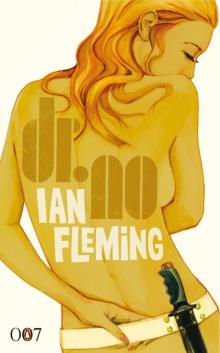 Doctor No
Doctor No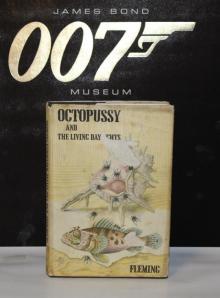 Octopussy & the Living Daylights
Octopussy & the Living Daylights On Her Majestys Secret Service
On Her Majestys Secret Service You Only Live Twice
You Only Live Twice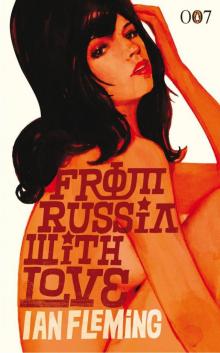 From Russia With Love
From Russia With Love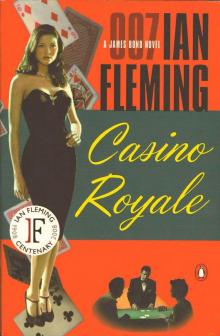 Casino Royale
Casino Royale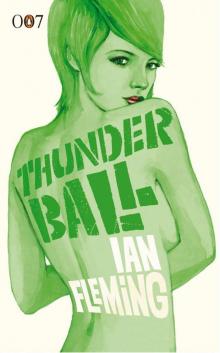 Thunderball
Thunderball For Your Eyes Only
For Your Eyes Only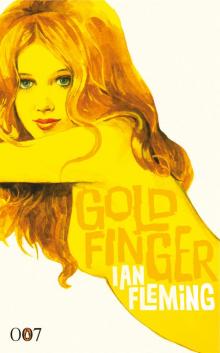 Goldfinger
Goldfinger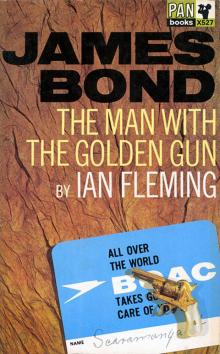 The Man With the Golden Gun
The Man With the Golden Gun The Spy Who Loved Me
The Spy Who Loved Me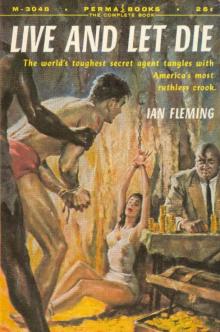 Live and Let Die
Live and Let Die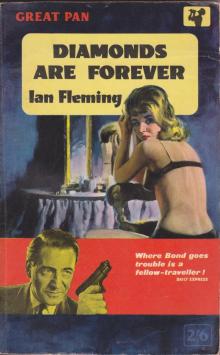 Diamonds Are Forever
Diamonds Are Forever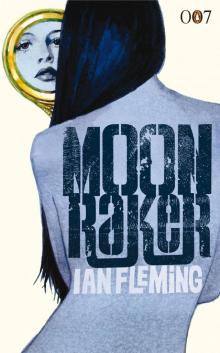 Moonraker
Moonraker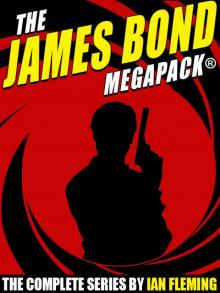 The James Bond MEGAPACK®
The James Bond MEGAPACK®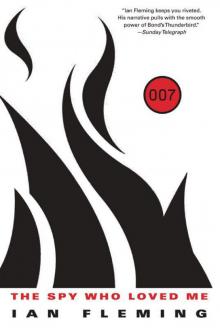 Bond 10 - The Spy Who Loved Me
Bond 10 - The Spy Who Loved Me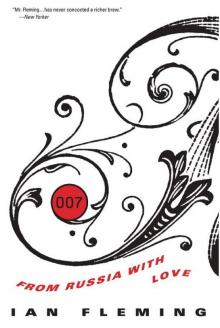 From Russia with Love (James Bond - Extended Series Book 5)
From Russia with Love (James Bond - Extended Series Book 5)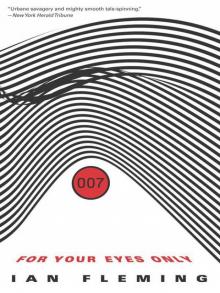 Bond 08 - For Your Eyes Only
Bond 08 - For Your Eyes Only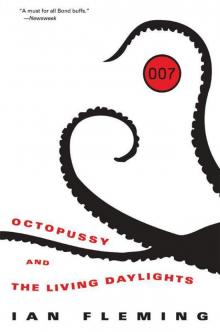 Bond 14 - Octopussy and the Living Daylights
Bond 14 - Octopussy and the Living Daylights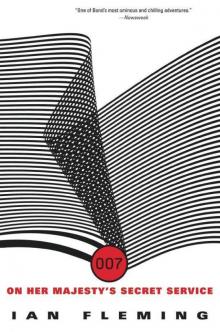 Bond 11 - On Her Majesty's Secret Service
Bond 11 - On Her Majesty's Secret Service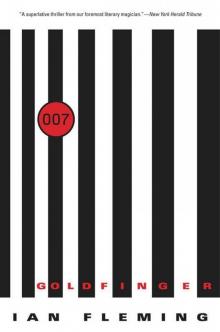 Bond 07 - Goldfinger
Bond 07 - Goldfinger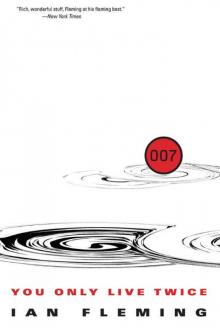 Bond 12 - You Only Live Twice
Bond 12 - You Only Live Twice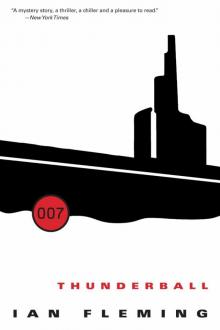 Bond 09 - Thunderball
Bond 09 - Thunderball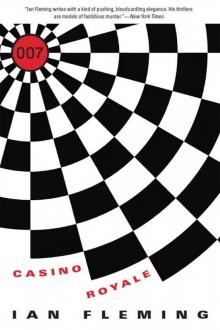 Bond 01 - Casino Royale
Bond 01 - Casino Royale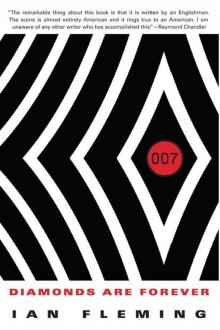 Diamonds are Forever (James Bond - Extended Series Book 4)
Diamonds are Forever (James Bond - Extended Series Book 4)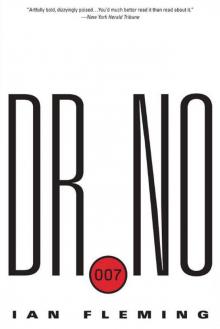 Bond 06 - Dr. No
Bond 06 - Dr. No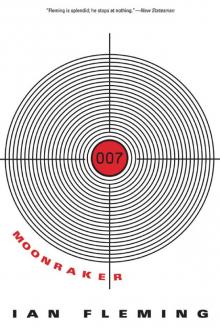 Moonraker (James Bond - Extended Series Book 3)
Moonraker (James Bond - Extended Series Book 3)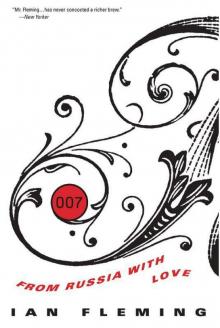 Bond 05 - From Russia With Love
Bond 05 - From Russia With Love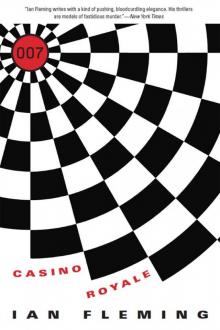 Casino Royale (James Bond - Extended Series Book 1)
Casino Royale (James Bond - Extended Series Book 1)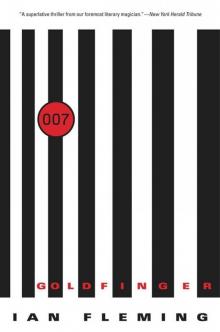 Goldfinger (James Bond - Extended Series Book 7)
Goldfinger (James Bond - Extended Series Book 7)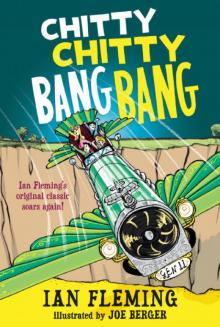 Chitty Chitty Bang Bang: The Magical Car
Chitty Chitty Bang Bang: The Magical Car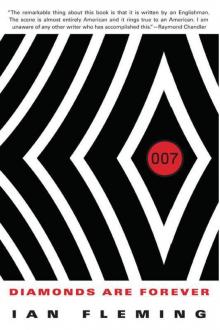 Bond 04 - Diamonds Are Forever
Bond 04 - Diamonds Are Forever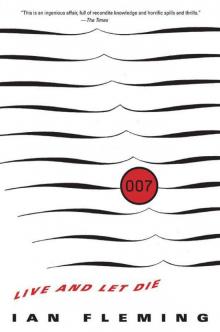 Bond 02 - Live and Let Die
Bond 02 - Live and Let Die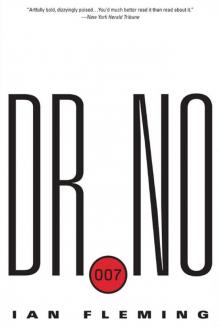 Dr. No (James Bond - Extended Series Book 6)
Dr. No (James Bond - Extended Series Book 6) The Hildebrandt rarity
The Hildebrandt rarity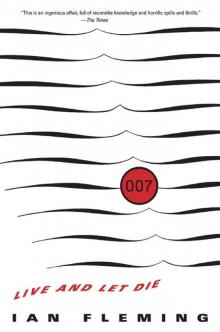 Live and Let Die (James Bond - Extended Series Book 2)
Live and Let Die (James Bond - Extended Series Book 2)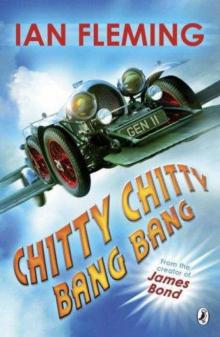 Chitty Chitty Bang Bang
Chitty Chitty Bang Bang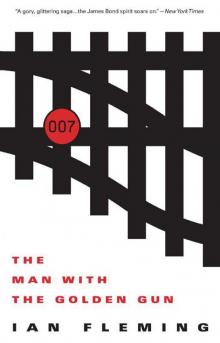 Bond 13 - The Man With the Golden Gun
Bond 13 - The Man With the Golden Gun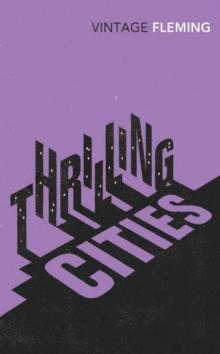 Thrilling Cities
Thrilling Cities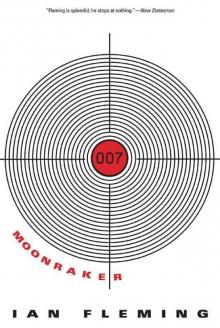 Bond 03 - Moonraker
Bond 03 - Moonraker